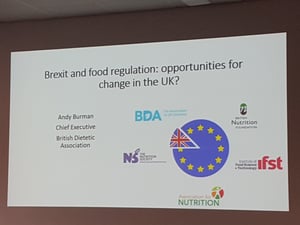Food Matters Live is an annual event, based at the ExCeL London, which brings together the food and drink industry across retailers, foodservice providers, government, education and those working in nutrition. Needless to say, it’s a huge event which allows for a massive variety of those in the industry, across the globe, to collaborate, learn and inform. With five of the IFIS team attending across Tuesday and Wednesday, we got stuck into as many of the seminars and exhibitions as possible, to hear about the latest news and innovations in food. Here, we detail just a few of our highlights from the event.
our key notes from seminars
Nutrition for healthy ageing: The role of nutrition
This seminar featured speakers such as Dr Carrie Ruxton, Dietitian and Nutrition Consultant, on behalf of The Health and Food Supplements Information Service and Professor Parveen Yaqoob, Head of the School of Chemistry, Food & Pharmacy at the University of Reading.
With rising life expectancy and decreasing birth rates, over 60s are the fastest growing sector of the global population. The seminar discussed the latest insights into the ageing consumer and highlighted new areas of research to better understand the role of nutrition to support healthy ageing and help in the management of age-related diseases.
Maria Mascaraque, Food and Nutrition Senior Analyst at Euromonitor International, discussed opportunities for food and drink manufacturers to cater for the ageing consumer, such as products that are eligible to carry a cardiovascular or bone and joint approved health claim. For example, novel ingredients such as the use of moringa for bone health and DHA extracted from algae were also discussed in detail.
Worldwide, 1 in 3 women over the age of 50 will experience osteoporotic fractures, as will 1 in 5 men aged over 50. Non-communicable diseases such as osteoporosis and obesity do not happen overnight, they happen slowly over the years. This suggests that there needs to be more emphasis on young people, from ages 18-35, to focus on achieving optimal health before coming into their 40s and 50s.
The speakers also discussed the statistic of 25-40% of people in the UK who have low to insufficient levels of Vitamin D. We reach our optimal or maximum bone density by 25-30 years old, highlighting the importance of Vitamin D and calcium in adolescence to achieve peak bone density. Limitations in reaching potential bone density are brought about by a number of aspects, including poor diet habits and fad dieting in teenage years. Women can lose up to 40% of their bone mass over their lifetime if they don’t reach their peak bone density in their youth, which seriously increases their risk of osteoporosis, fragility and fractures later on in life.
The impact of Brexit on regulation and standards in the food and drink industry
This seminar featured talks from industry professionals including Andy Burman, the Chief Executive of the British Dietetic Association and Peter Wareing, Food Safety and Manufacturing Consultant of Leatherhead Food Research.
At 11pm on 29th March 2019, Brexit is due to take force and the UK will break away from the European Union. We are already almost into 2018, but is the UK prepared for this transition out of the EU?
As part of the Great Repeal Bill, food and beverage EU legislation will be converted into UK law. The legislation will remain the same as the EU until the UK government has decided which regulations to retain, adapt or drop to suit the UK’s needs.
As part of the Brexit process, the UK may acquire third country status outside the EU, which will incur additional tariffs and charges for importing and exporting food into Europe.
If there are savings upon leaving Brexit, Andy Burman suggested that it may be a wise idea to invest into agricultural and horticultural innovations, such as selective harvesting technology.

Exploring the latest strategies for weight wellness
This seminar was chaired by Dr. Alex Johnstone, Senior Research Fellow, Rowett Institute, University of Aberdeen.
The session explored the features of a healthy and sustainable diet for weight management, including discussion of functional foods and the latest evidence surrounding the use of sweeteners and probiotics in relation to weight management.
The most common sources of protein in the UK diet were discussed by reviewing information provided by the latest NDNS, showing that all bar one (baked beans) were from animal sources. With the WHO’s recommendation to limit red meat consumption to <500g/week due to the evidence-based link between red/processed meat consumption and certain cancers (namely bowel), this is of concern. Dr Johnson explored the benefits of flexitarianism and alternative sources of protein, such as grains, beans and pulses, to ensure all essential amino acids are consumed, and the benefits that these small dietary changes can have on long-term health status.
Dr. Emma Derbyshire, Independent Nutrition Consultant and Founder from Nutritional Insight Limited, delivered a fascinating talk about the increasing use of natural sweeteners as a weight management solution, and recent customer demand for non-synthetic sweeteners, such as stevia. The distinct differences between low calorie and bulk sweeteners were defined, alongside the sensorial and structural role they play in products on the market.
She outlined the two sides of the debate among dieticians regarding the potential for sweeteners to be used in weight management. Some have argued that sweeteners can adversely work to stimulate sweet receptors, and therefore play on our innate liking for sweet food, leading to increased intake of sweet foods and subsequent weight gain. However, a recent study suggested the contrary. The study participants were divided into two groups; one group were asked to drink only non-nutritive sweetened (NNS) beverages over a year, whilst the control group were asked to drink only water. At the end of the experimental period, the participants were weighed, and the data compared against their baseline anthropogenic measures. Results showed that the NNS treatment was superior to water for weight loss and maintaining the lower weight. The study suggested that individuals limited to water seek out sweet food to satisfy their innate craving for sweetness, whereas frequent consumption of NNS sweetened beverages may help to better regulate appetite by satisfying the participants craving for sweetness. Swapping full-sugared beverages for artificially sweetened alternatives could potentially be a reliable, achievable and sustainable method of weight loss; however, more randomised control trials are required to support this theory.
exhibitors and trends
- Valio - This dairy company is the largest in Finland, and Dr Kevin Deegan, Consumer Insight Manager, discussed the innovations that their Research and Development department have developed over the past 100 years. In a crowded industry, they produce a range of kefir yoghurts, which also contain calcium, vitamin D and LGG, the world’s most studied lactic acid bacterium. Kefir yoghurts are often celebrated for containing around 47 strains of probiotic bacteria, in comparison to the usual two found in most yoghurts.
- Trea - This brand new Greek company gave us a taste of their delicious honey products, each of which contain different flavour notes due to the origin of their honey bees, ranging from the pine trees in the Agrafa mountains, to the wildflowers found on the bay of Prinos.
- Boka – Producers of cereal bars and free from foods, Boka displayed all green traffic lights on its front-of-pack nutrition labelling, indicating that they have been able to formulate their products to include less fat and sugar. This was interesting to see, as a gluten free products and free from products can be high in sugar, which limits the amount of healthy options for those with intolerances and allergies.
With a number of booths and seminars, “Free From” foods were prominent, along with food on the move, in particular breakfast bars and portable cereal/porridge pots. This trend suggests that many consumers have limited time for breakfast, whether this is due to long commutes or longer working days. Many exhibitors provided their own unusual twist on their health snacks, such as the Greek company Three Hearts, who include sea buckthorn as one of the main ingredients in their cereal bars.
 CONCLUSION
CONCLUSION
With over 800 exhibitors and 300 expert speakers present
across the conference, Food Matters Live continues to be one
of the most prolific conventions in the UK for communicating food innovations and research. We're already excited to see what 2018 has to offer!
REFERENCES
Lanham-New, S. (2008). Importance of calcium, vitamin D and vitamin K for osteoporosis prevention and treatment. Proceedings of the Nutrition Society, 67(02), pp.163-176.
Peters, J., Beck, J., Cardel, M., Wyatt, H., Foster, G., Pan, Z., Wojtanowski, A., Vander Veur, S., Herring, S., Brill, C. and Hill, J. (2015). The effects of water and non-nutritive sweetened beverages on weight loss and weight maintenance: A randomized clinical trial. Obesity, [online] 24(2), pp.297-304. Available at: https://www.ncbi.nlm.nih.gov/pmc/articles/PMC4744961/.


